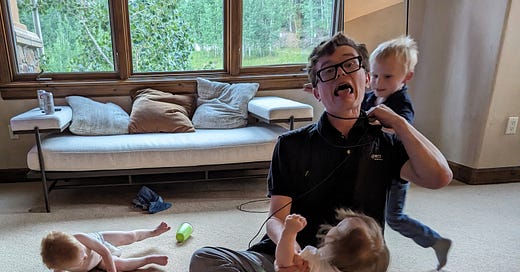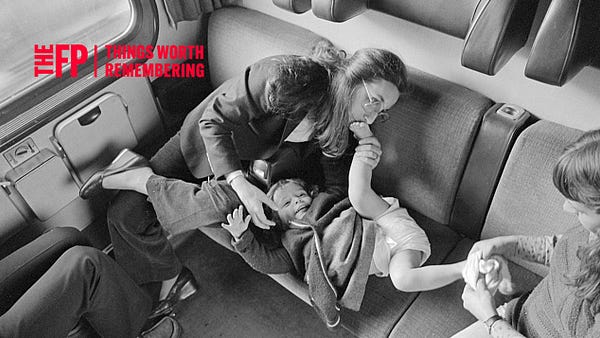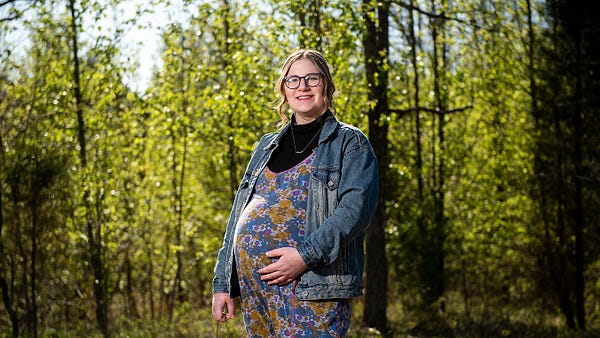
The Free Press

My wife Simone and I are pronatalists. At the ages of 36 and 37, respectively, we have four children—and one day hope to have at least seven, but ideally as many as twelve. We know it’ll make life hectic. But our lives already are.
A typical day for us already starts between two and five in the morning, when Simone and I try to get in some work before the kids wake up. After making breakfast with them and dropping them off with the neighbors, we often take a walk as a couple, to talk about our business or our nonprofit. Then we get online and try to explain to the world that we are not, in fact, far-right ideologues who want to usher in dystopia.
It’s the last bit that’s the only real challenge we face.
A lot of people quietly share our beliefs, but Simone and I preach what we practice. We don’t just have a bunch of kids—we talk about it, too, on X, on Instagram, on our podcast, and at the occasional conference. We do this because we are deeply disturbed by the modern world’s trend toward childlessness and want to do our bit to push back against it. But we could never have anticipated the hate we’d receive for doing this.
After a 2023 Telegraph profile of our family branded us “the ‘elite’ couple breeding to save mankind,” we were pelted with everything from the observation that we resemble nearsighted parsnips (which we found funny) to death threats (slightly less amusing). Last month, I featured in a Politico report on the first ever Natal Conference, which took place last year; the headline was “The Far Right’s Campaign to Explode the Population.” Strangers online immediately began framing the conference and movement as “a big conclave of dudes discussing how women should bear more children” and a desperate attempt on behalf of Christians to keep America from being “taken over by Hispanics” (never mind that Hispanics are more likely to be Christian than the average white American).
Most recently, a profile of my family in The Guardian went viral because it described how I disciplined our two-year-old son: after he tried to kick over a table in the restaurant where I was speaking to the journalist, I lightly slapped his face.
In our family, we encourage rough-and-tumble play. But when someone is at risk of getting hurt, and our spoken warnings don’t land, we lightly “bop” the kids to reorient them and show a boundary has been crossed. This is done to shock and refocus attention, not to hurt. We use this method very sparingly. We never act in anger, and we never act to cause pain. We don’t use the “bop” with kids over four, who are capable of reasoned conversation, and we never engage in delayed punishment, like spanking.
In this country, the debate over spanking, or any kind of physical discipline, has been framed by the media as completely settled. Many of today’s most celebrated parenting experts say that it’s always bad, no matter what, under any circumstance. However, this is not what the data shows. A recent meta-study shows that previous studies were deeply flawed, and that light corporal punishment has a neutral or even mildly positive effect. This is something most of us intuit when we actually have to parent kids, as can be seen in the fact that the majority of American parents use corporal punishment to discipline our toddlers.
When you are elevating a behavior as uniquely out of line, it can either be done physically or through emotional escalation. But it’s hard for a two-year-old to grasp a concept like “that can kill your sister.” One of the reasons corporal punishment can be better than emotional punishment is that it allows parents to immediately reassure kids that they’re still loved. When I “bopped” my son I told him, “I love you, but you gotta be nice in restaurants.” Within thirty seconds he was back to playing and laughing.
But the Guardian article precipitated an online panic about our fairly ordinary parenting, framing it as though my “mask slipped.” In addition to those who insisted our children should be taken away from us, some threatened to come to our home to “smack the shit” out of me and hoped that all our next children are stillborn. Simone’s normally sleepy Instagram account received an influx of hate comments, while I found myself, for the first time, blocking people on Facebook.
Why was there so much rage for us at doing something that so many other parents do? It’s because much of the media is hell-bent on presenting pronatalists as evil and backward. The “bop” became Exhibit A.
Contrary to what some journalists insist, the aim of pronatalism is not to force women to be tradwives, or to enforce Christianity, or even to explode the population. It’s to call attention to an obvious and, we believe, dangerous trend. In 2010, America’s fertility rate—the number of births per woman—was 1.93. That’s just below the “replacement rate,” with which a population can sustain itself, of 2.1. But just a decade later, that number had fallen precipitously to 1.66. If it keeps falling at this rate, and we have one generation every 30 years, there will be only 3.7 great-grandkids for every 100 Americans alive today. Given that only 45 percent of young adults say they want kids, for the population to stabilize, they’ll need to have over four kids each. That’s probably not going to happen. And no, immigration is not the answer given that Latin America’s fertility rates are also in a freefall.
The consequences of fertility collapse will be dire. If you think all we have to worry about are Social Security and Medicare—which we can afford only if the young outnumber the old—think again. Infrastructure would crumble. Imagine if, for instance, New York City lost half its population. The cost of maintaining its infrastructure would not halve. You don’t get to shut down half the sewer system or half of the roads. Taxes would spiral out of control.
Speaking of taxes: we believe in them. My wife got her degree in environmental business and started her career working for the Earth Day Network and the American Council on Renewable Energy. We are also pro-choice and support gay rights. We advocate for more surrogacy and egg and sperm donations, and against stricter government regulations for these things so that more people can have the children they want. We know that religious extremists will criticize us for using IVF—but with over half of the developed world projected to be infertile by 2060, we see normalizing the process as critical. We want there to be more acceptance for neurodiverse children and adults; Simone and two of our kids are autistic.

Simone and I also don’t believe in putting pressure on anyone who doesn’t want to have children—but there is plenty of evidence that many people want more children than they have.
So many in our cohort—millennials and Gen Z on the social left—say they can’t have a big family, or a family at all, because it’s simply too costly. Never mind that historically, the less money someone has, the more kids they have. The truth is, when some people say “I can’t afford children,” what they really mean is “I can’t afford children without sacrificing the quality of life I have grown accustomed to.”
It’s not necessarily their fault. In the prevailing culture, instant gratification is prized, and in-the-moment discomfort is framed as inherently bad. For many in our cohort, asking someone to deny an impulse is absurd. Telling someone that, for the sake of future generations, they might have to live with less, is completely out of the question. Suggesting that the huge sacrifices associated with having children—including the discomfort that comes with disciplining them—might be worth it is beyond the pale.
All of which is why we’re resigned to the idea that the legacy press will always frame Simone as a creepy tradwife—even though she’s an exemplar of the progressive idea that “women can have it all.” She’s a mother, CEO, and nonprofit leader, and now a candidate for state representative in Pennsylvania. If it helps get our message across to people, we’re willing to accept the media’s attacks on our character or our parenting.
We’ll continue to do what we think is right and say what we think is true—while combining the best practices from various ideologies, ranging from conservative religions to hyper-progressive Silicon Valley subcultures. We’ll keep muddling along in our retrofuturistic farmhouse, in which our kids chat with AI agents and smart devices inside 300-year-old walls, while baking bread, feeding our chickens, and harvesting berries from our garden.
The world may criticize and demonize us for our views, but in the end, we love every day with our precious kids. In fact, we have already marked the date in our calendar for when we’ll go back to our IVF clinic to bring yet another into the fold.
Malcolm Collins is the co-host of the Based Camp podcast and founder of the nonprofit Pronatalist.org. Follow him and Simone on Twitter @SimoneHCollins.
Become a Free Press subscriber today:














This guy has 4 kids and that’s…news? I’m confused.
If two only children get together and have one child, that child has no brothers, sisters, aunts, uncles or cousins. They are just one lonely leaf on a dying family tree, and it only takes two generations to happen. It's sad. Kids, and not jobs or wealth or experiences, are the true life givers to all involved.